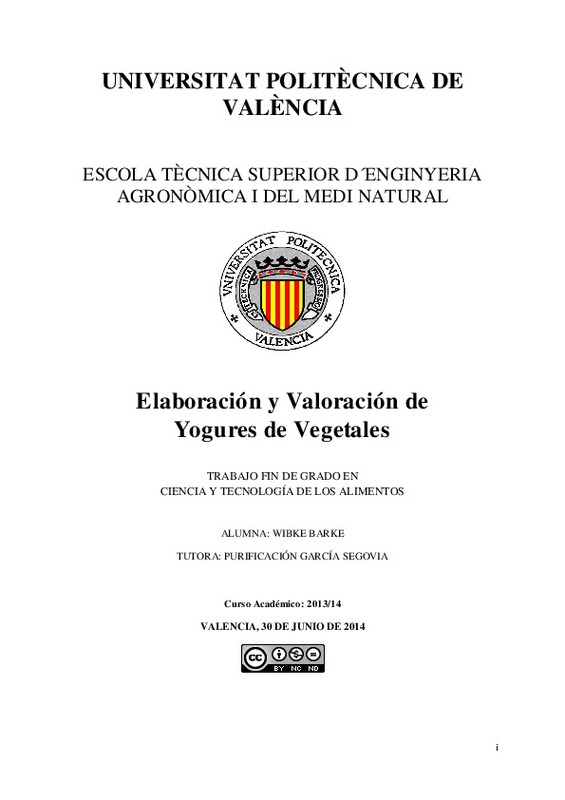|
Resumen:
|
[ES] El presente Trabajo Fin de Grado, “Elaboración y Valoración de Yogures de Vegetales”, consistió en la formulación, elaboración y posterior valoración de las características fisicoquímicas, microbiológicas y sensoriales ...[+]
[ES] El presente Trabajo Fin de Grado, “Elaboración y Valoración de Yogures de Vegetales”, consistió en la formulación, elaboración y posterior valoración de las características fisicoquímicas, microbiológicas y sensoriales de un yogur de vegetales. Se realizaron cuatro formulaciones: una muestra control, una con 1.3% de fibra soluble (Nutriose®), una con 6.25% de concentrados Nutrifood® de tomate y zanahoria, y la última, con un 1.3% de Nutriose® más un 6.25% de concentrados vegetales Nutrifood®. Los recuentos totales de Lactobacillus delbrueckii subsp. Bulgaricus y Streptococcus thermophilus confirmaron el cumplimiento de la Norma de Calidad del yogur, ya que todas las formulaciones realizadas presentaron un recuento mayor que 107 UFC/g. En función de la textura firme o batida de las formulaciones realizadas, cada formulación se analizó con un texturómetro o un reómetro. La aceptabilidad por parte de los consumidores fue evaluada en dos catas independientes. En la primera, una cata “ciega”, el 30% de los consumidores fue capaz de identificar el sabor tomate; en la segunda, los catadores sí que estaban informados acerca de los sabores de las muestras y se observó un incremento significativo (p<0.05) en cuanto a la aceptabilidad global de las muestras con fibra y concentrados vegetales, respecto a la primera cata.
[-]
[EN] The Bachelor thesis “Elaboration and Evaluation of vegetable yogurts” aimed to formulate, elaborate and evaluate the physicochemical, microbial and sensory properties of such products. Four formulations were developed: ...[+]
[EN] The Bachelor thesis “Elaboration and Evaluation of vegetable yogurts” aimed to formulate, elaborate and evaluate the physicochemical, microbial and sensory properties of such products. Four formulations were developed: one control sample, one sample with 1.3% of soluble fiber (Nutriose®), one with 6.25% of Nutrifood® carrot and tomato concentrates, and the last one, with 1.3% of Nutriose ® and 6.25% of Nutrifood® concentrates. Total microbial counts of Lactobacillus delbrueckii subsp. Bulgaricus y Streptococcus thermophilus confirmed compliance of all the formulations with the quality standard following European regulations for yogurts, since the microbial counts were greater than 107CFU/g. Based on the firm or stirred texture of the yogurts, each formulation was analyzed with a texturometer or a rheometer. Consumer acceptability was evaluated in two independent sensory evaluations: in the first one, a blind test was performed to determinate the flavor of the samples and 30% of the consumers recognized the tomato flavor; in the second one, consumers were informed about the flavors of the samples and an increase of the overall acceptability of the samples with fiber and vegetable concentrates was statistically significant (p<0.05) compared with the previous test.
[-]
|







